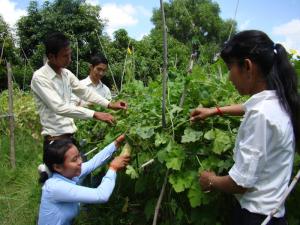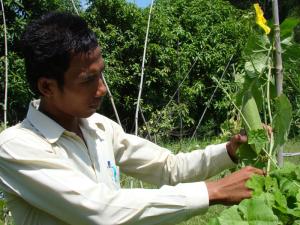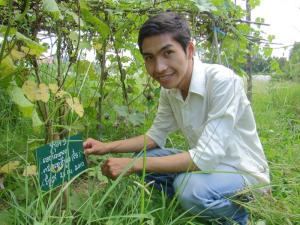Agriculture contributed around a third of Cambodia’s national GDP in 2009, according to Council for the Development of Cambodia statistics. But to maximise the fruits of this sector, the Kingdom’s government is working on commercialising agriculture to increase national income and create more jobs for Cambodians.
San Vanty, undersecretary of state of the Ministry of Agriculture, Forestry and Fisheries, said while Cambodia exports many agricultural products, rice is the highest priority. It has been acknowledged by many, including Prime Minister Hun Sen, as Cambodia’s “white gold.”
Before 2007, Cambodia exported unprocessed paddy rice to Thailand and Vietnam for processing, following which those countries exported the finished product overseas. According to San Vanty, this is all changing with the entry of processing machine into the Kingdom. Now Cambodia can export milled rice overseas. Recent deals discussed in June with the Philippines to export 200,000 tonnes of rice and orders worth nearly US$1 million with four European nations later this month are showing the rise of the sector’s commercialisation.
“Importing rice processing machines has been very beneficial because now we have both the rice and rice husks in Cambodia, so that besides gaining more income from exporting higher-quality processed rice, we can use the rice husk as fertiliser for the rice field,” he said.
He added that as a result of the rise in the processing industry Cambodians will get more jobs because of a need for machine operators.
San Vanty, however, also dismissed fears that the small and medium companies would suffer without the modern processing machine.
“It’s impossible that they will go bankrupt because these companies can continue selling their product in the local market, while the product from modern machines will be used for exporting to foreign countries, since these products meet the international standard.”
With the new machines allowing Cambodian rice to now meet international standards, the government is actively involved in finding places where Cambodian rice product can be exported.
“Business agreements between countries are very important,” said Kong Putheara, director of the Department of Trade Statistics and Information at the Ministry of Commerce. “We can negotiate with our partner countries to reduce the cost of the import tax imposed.”
Kong Putheara explained that though countries can export products to other countries without signing business agreements, they usually cannot negotiate the import tax. “If the tax price is high, then this added to the transportation costs, meaning we cannot compete with the local products.”
The other main benefit of developing agro-business is technical support. “If we aren’t able to produce a qualified product, we can ask country in the business agreement to send technical experts to help us in production,” said Kong Putheara.
As the government invests in agriculture, particularly in infrastructures such as watering and irrigation systems, reservoirs and dams, the knock on effect is felt in the rural banks, which have the confidence to distribute more loans to rural farmers helping development.
ACLEDA Bank Plc, with over 1,695 branches and offices throughout Cambodia, particularly targets rural industry and has seen a boom in agricultural loans.
“I note that the agricultural loans used to be less than 4 percent in the banking sector in 2007, and in 2009 it has increased to 6.7 percent,” said In Channy, president and CEO of ACLEDA.
He said that ACLEDA had seen its agriculture and agricultural-related loans surge from US$14.76 million in 2005 to US$92.17 million by June 2010.
“Look at 2009 figures, Garment export was down by 27 percent and the tourism sector was also down by 3 percent. However, the surplus of rice was more than 3 million tonnes – that’s a huge surplus,” In Channy said. “I think without the input from the growth of agriculture and its exports, the GDP of 2009 would be in the red already.”
As the agricultural sector is being developed, people working in recruitment agencies are optimistic about job opportunities in agro-business in the future.
“There will be more jobs for Cambodians,” said Vat Sreyvoat, a senior recruitment consultant at Great Alliances employment agency.
“More and more foreign investors will come to invest in Cambodia when the agricultural sector is being developed, and the job opportunities will come to Cambodians, as foreign companies will want to hire Cambodians,” she added.
Sandra D’Amico, managing director at HR Inc Cambodia, another recruitment agency, agreed that agricultural commercialisation will no doubt create numerous jobs across the country as investors look to localise foreign management as soon as possible to be competitive. She also predicted that the rise in agro-business would create opportunities for young Cambodians, those in the provinces, and help the growth of certain skills markets.
“Young entrepreneurs wanting to capture a part of the local market are likely to pop up and bring a new face to agro-business in Cambodia,” she said. “The need for standards, health and hygiene measures, good business management and planning, financing, as well as information dissemination from government and interested stakeholders, is going to be key to making the small- and medium-enterprise sector successful in their quest to share in this dynamic market.”
D’Amico added that the agricultural industry would bring jobs to provinces, as rise of agro-business would mean an emphasis on the countryside and that the young would not have to migrate to the cities.
by: Dara Saoyuth and Daniel Pordes
This article was published on Lift, Issue 28, July 21, 2010





